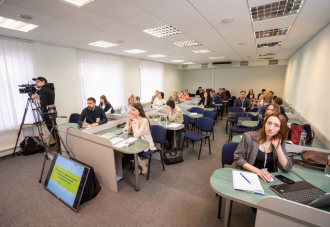On November 30, the 10th Civil Society Development Forum took place in Ukraine. Its participants shared their experiences and achievements and sought solutions to the challenges facing civil society organizations (CSOs).
One of the panel discussions was entitled “Financial Sustainability of Non-Profit Organizations, Best Practices for the State”, and it focused on how the government can help civil society by supporting its development. The discussion was organized by the Centre for Democracy and Rule of Law (CEDEM).

See the event video at the link
“The state is doing a lot, but it can do a lot more,” said Maksym Latsyba, head of the Civil Society Development Program at the Ukrainian Center for Independent Political Research. One of the recent changes he noted were amendments to the legislation making social services (provided by NGOs and charitable organizations) not subject to personal income tax. This amendment was made possible through the efforts of public activists.
In general, the state has allocated funds that CSOs can receive for specific projects. “If you have a look at the draft budget, it stipulates at least UAH 123 million for youth organizations, organizations of veterans and people with disabilities. And this is in addition to what the Ukrainian Cultural Foundation offers. It provides money not only to NGOs; however, they also have a chance to receive part of the UAH 650 million. This is quite a lot of money,” concludes Mr. Latsyba.
Maryna Popatenko, Deputy Minister of Family, Youth and Sports, agrees that the development of the public sector is important. She emphasized the project competitions for CSOs held by the Ministry of Youth and Sports.
One of the priorities according to the Deputy Minister is to transfer such competitions to electronic format, to the VzaemoDiia platform. According to Maryna Popatenko, this will make the procedure more open and encourage regional state administrations to involve the public sector in youth development programs.
Another task mentioned by the speaker was support for the development of NGOs on the part of the state. “We have developed a curriculum for civil society institutions to improve their competence, provide support for financial and organizational management, information work, and improve domestic policies.”
The state helps CSOs at the expense of taxpayers, but there is a format in which citizens can directly fund selected organizations – the tax designation mechanism. Hlib Kolesov, lawyer and advocacy manager at the Centre for Democracy and Rule of Law, spoke about it.

For citizens, such a mechanism will mean the opportunity to transfer 2% of personal income tax (PIT) to non-profit organizations. Ukrainians will choose the CSOs they trust, and they will be able to do so through the taxpayer’s personal account. This mechanism has been working in Poland and Lithuania for more than a decade (in Ukraine, the idea is still at the level of draft laws).
“The tax designation mechanism will strengthen the financial capacity of NGOs and charitable organizations and at the same time encourage citizens to show more interest in what their taxes are used for. People will be able to ‘lobby’ for change, because CSOs are often at the forefront of useful ideas embodied in the law,” the lawyer said about the usefulness of the mechanism.
If 5% of Ukrainians exercised this right today, NGOs and charitable organizations would receive UAH 160 million. For them, these funds would serve as a significant incentive, and for the state budget the amount would not be critical.
Viacheslav Bykov, executive director of the Tabletochki Charity Foundation, also said that philanthropy should be convenient and citizens should be allowed to dispose of part of the taxes.
“Our fund receives 90% of its funds from the citizens of Ukraine. What’s the catch? We are trying to integrate into the usual processes and become as invisible as VAT. That is, you buy goods, do something ordinary – and a certain amount is sent to charity.”
The idea of the tax designation mechanism was supported by Liuben Panov, program consultant of the European Center for Non-Profit Law: “It encourages organizations to be proactive. It is a usual thing to see posters where CSOs describe their activities, the culture of philanthropy in society is also developing. At the same time, with such state support, there is no political influence on who will receive assistance.”
However, the expert advises us to remember that the redistribution of part of taxes does not constitute charity. After all, in some of the countries, citizens believed that if there is tax designation mechanism, the public sector no longer needs help. Awareness raising campaigns will also be needed for society to understand the new changes.
Sorina Macrinici, an expert at the Legal Resources Centre from Moldova, also shared her country’s experience. According to them, the public sector of the country not only worked on the introduction and improvement of the tax designation mechanism, but also held trainings and awareness raising campaigns on how to do it. There are guarantees of transparency.
“Every year the tax office publishes a report on the 2% mechanism in Moldova, and organizations must also submit information on the use of the 2% funds. And payers can submit inquiries and find out what the money was spent on.”

The team of the Centre for Democracy and Rule of Law also presented the results of a virtual tax experiment. One week ago, CEDEM developed and distributed an interactive online calculator. Participants had to fill out a questionnaire (anonymously), indicating their income, and the computer determined how much they could spend to support NGOs or charitable organizations.
So as of November 30, 361 people took part in the survey. Of these, 85.71% are willing to use 2% of their taxes to support CSOs, and 11.43% are willing to use 1% or less. The survey is not representative, but proves the public demand for such changes.
This event was organized as part of the Project Ukraine Civil Society Sectoral Support Activity implemented by the Initiative Center to Support Social Action “Ednannia” in partnership with the Ukrainian Center for Independent Political Research (UCIPR) and Centre for Democracy and Rule of Law (CEDEM) with the sincere support of the American people through United States Agency for International Development.



